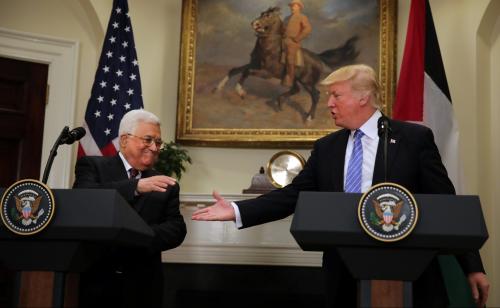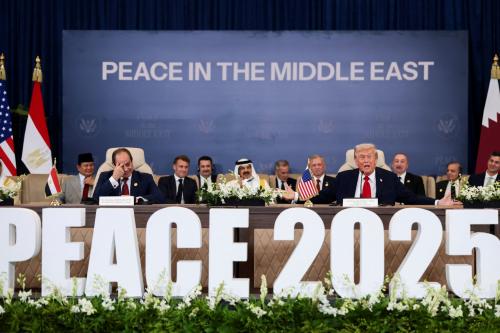The White House invitation to Palestinian Authority President Mahmoud Abbas is a sign that President Trump appears willing to engage on the Israeli-Palestinian issue in a way that does not shatter previous norms, write Hady Amr and Ilan Goldenberg. However, now the hard work begins. This piece originally appeared in Foreign Policy.
This week, Palestinian Authority President Mahmoud Abbas heads to Washington as President Donald Trump makes his first major foray into Israeli-Palestinian peacemaking. Thus far, the administration’s approach has exceeded expectations. Fears that Trump would quickly move the U.S. embassy to Jerusalem and declare open season for Israeli settlement construction have not materialized. Instead, he has declared his intention to make Israeli-Palestinian peace a priority. He has taken early steps to build a good relationship with Prime Minister Benjamin Netanyahu, while still encouraging the Israelis to restrain settlement activity. He has dispatched a special envoy—Jason Greenblatt, the president’s special representative for international negotiations—who has conducted a wide-ranging listening tour to get smart on the issues. And the White House invitation to Abbas is a sign that Trump appears willing to engage on this issue in a way that does not shatter previous norms. However, now the hard work begins.
Given his natural inclination to make a splash, Trump may look for a big breakthrough on a final peace agreement and use their meeting to ask Abbas to resume negotiations. This would be unwise and is unlikely to work. For Abbas, going back to negotiations with the Israelis comes with a major cost. After nearly 25 years of failure, the Palestinian public considers negotiations as purely an excuse by the Israelis to buy time while they continue to build settlements and perpetuate the occupation. This is especially true right now, as Abbas faces internal political pressure from a major Palestinian prisoner hunger strike led by one of the men looking to succeed him—Marwan Barghouti. To go back into negotiations, Abbas will need a high-profile concession from Netanyahu that he can sell. But given the power of the far-right wing of the Israeli governing coalition, Netanyahu will not be able to take such a step.
The United States may try to sweeten the deal for Israel by leveraging the converging interests that Israel and the Arab states share in pushing back on Iran.
The United States may try to sweeten the deal for Israel by leveraging the converging interests that Israel and the Arab states share in pushing back on Iran. The hope would be to get the Arabs to start publicly engaging with Israel, which would be politically helpful for Netanyahu, in exchange for Netanyahu making concessions to the Palestinians. But this formula is also unlikely to work. The Arab states are already getting the security cooperation they want from Israel and are happy to keep it quiet. They would need to see serious steps from the Israelis on the Palestinian front to take the risk of going public—steps that are again not possible given the right wing government in Israel.
Despite these obstacles, Trump may succeed in getting the parties back to the negotiating table through sheer persistence. But as former Secretary of State John Kerry learned in the 2013-2014 negotiations in which we participated, fear of being blamed by the United States can get the parties to the table—but it will not get them to make the major trade-offs on core issues such as the future borders of the Palestinian state, security arrangements for Israel, the final disposition of the Palestinian refugees, or arrangements for Jerusalem. The moment is simply not ripe for a big initiative.
Trump should instead seek a series of smaller steps from all sides that improve the quality of life for Israelis and Palestinians on the ground, preserve the possibility of the imperiled two-state solution, dissuade both sides from taking unhelpful steps, and create a better environment for future negotiations. Importantly, he should not make steps by the Israelis contingent on steps from the Palestinians, or vice versa. Don’t get drawn into negotiating between the two sides. Just individually work with both sides and get them to each take positive steps, unilaterally.
The Israelis should be asked to make moves to improve the Palestinian economy and expand basic freedoms. Israelis should see these steps as in their own interest: a more prosperous Palestinian economy should lead to a happier citizenry and more peaceful conditions on the ground. Vigorously addressing the vast economic imbalance between Israelis and Palestinians—is in everyone’s interest. A key obstacle to Palestinian economic development is land access. Population density in Palestinian-controlled areas is more than four times higher than in Israel and the 60 percent of the West Bank under Israeli administration. If a small percentage of the West Bank under Israeli control were transferred to the Palestinians—carefully selected for economic value where housing could be built, solar fields created, agribusiness developed, marble mines opened, and tourism developed—it could boost Palestinian GDP by double digits, creating much-needed jobs.
Palestinians seek an end to Israeli restrictions on their ability to leave or enter the West Bank through Jordan. Israel could almost immediately add an extra shift of customs officials to keep the borders open 24 hours a day, instead of only during prescribed hours.
Gaza has dire economic and humanitarian needs.
Gaza has dire economic and humanitarian needs. With unemployment at 40 percent—higher than any country on Earth—and electricity unavailable for the majority of the time, what Gaza desperately needs is power. Since under existing arrangements Israel is the major power supplier to Gaza, an additional electricity transmission line could be completed swiftly. As a follow-up, an agreement for a natural gas pipeline to Gaza should be concluded, though this would take a few more years.
The Trump administration also should help implement a number of agreements that the Israelis and Palestinians signed themselves—with the encouragement of the U.S. government—over the past few years. Some examples include bringing much needed 3G communications technology to the West Bank, removing the indirect taxation of health services, and repairing water systems. Implementation would replace outdated arrangements from the 1990s that are causing aggravation on the ground. These advances would have the additional benefit of dramatically tamping European criticism of Israel.
Israelis also seek an end to what Netanyahu described as Palestinian “call[s] for Israel’s destruction inside their schools, inside their mosques, inside their textbooks.” The Palestinian leadership should double down on its condemnations of incitement, no matter how much pressure they face from their own population. Despite the fact that Palestinians would argue that U.S. government-funded studies have already shown that incitement has been removed from Palestinian textbooks—and that Israel even allows Palestinian textbooks to be used in Israel-controlled East Jerusalem—problems persist. The Palestinian Authority should undertake an education advancement program that would deepen critical thinking skills, embrace a culture of inclusion, advance entrepreneurship, integrate technology into the classroom, and build stronger parent involvement. The Palestinian leadership already has such a plan, but what they need is the funding and partnership to implement it. Israelis and Palestinians will need a referee to help determine if progress is being made. In the 1990s, a joint American-Israeli-Palestinian trilateral commission monitored incitement. The Trump administration should push to revive such an entity.
Finally, there is the question of settlements. There have been reports that the administration is negotiating with the Israelis on what types of settlement activity would be acceptable and what are not. The Trump administration should avoid diving into this morass which could send the United States deep into a never-ending negotiation vortex. Moreover, even if Netanyahu and Trump could agree on terms, Israel’s pro-settlement coalition would balk. Instead, Trump should leverage his good relationship with Netanyahu to privately press him for as much restraint as possible without forcing an explicit agreement.
Ultimately, getting each side to take these small unilateral steps is not sexy. It requires patience—but the first 100s days of the Trump presidency may have instilled a dose of realism in the Trump team. If the American president can successfully convince both sides to take these actions, we might at least start to see improvements on the ground that create better conditions for peace in the future.
The Brookings Institution is committed to quality, independence, and impact.
We are supported by a diverse array of funders. In line with our values and policies, each Brookings publication represents the sole views of its author(s).











Commentary
A U.S. plan for the Abbas-Trump meeting
May 2, 2017